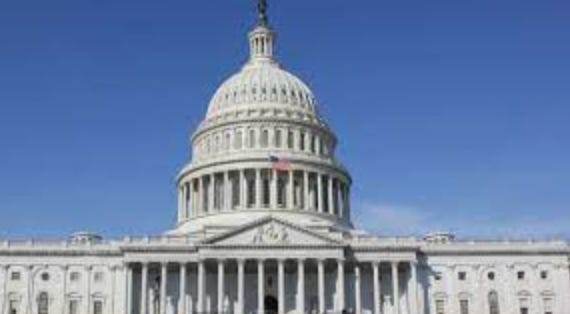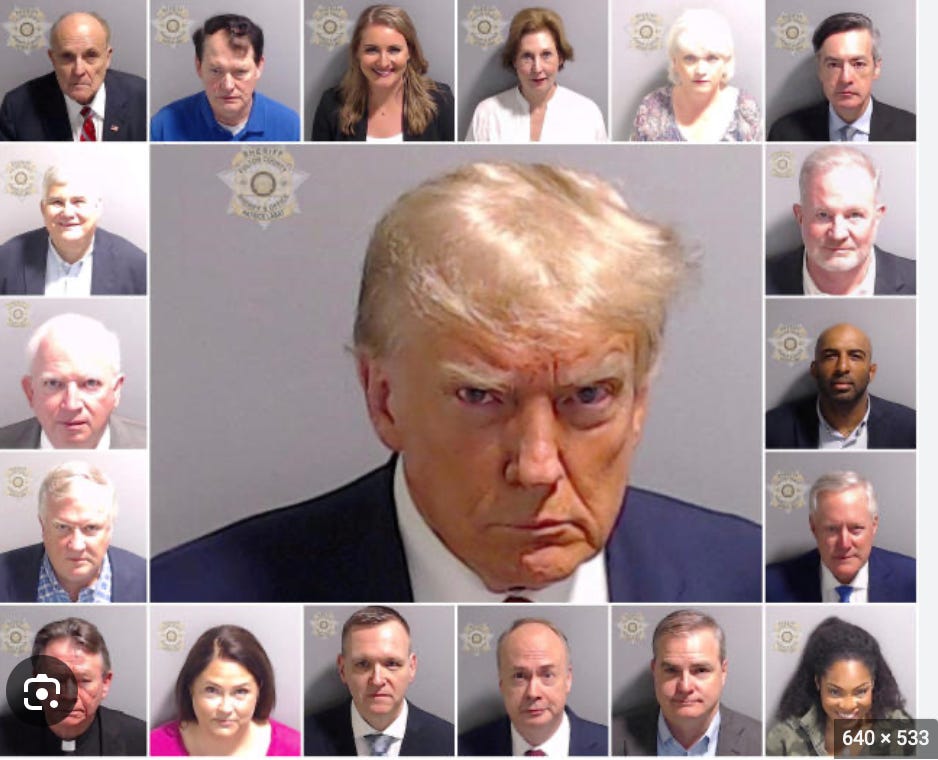

Discover more from The Freedom Academy with Asha Rangappa
Your Trump Court Cases Cheat Sheet
Having trouble keeping up with Trump's legal woes? I've got you covered.
If you’re feeling overwhelmed by the sheer amount of legal news involving Trump as a defendant, you’re not alone. I comment on this stuff and to be honest I am finding it hard to keep track of what’s going on where. I started making the below cheat sheet for myself, but figured that if I needed it, so did a lot of people. Keep in mind that things are moving quickly so some of the pieces may be dated soon (such as the precise issues or appeals in motion at this moment), but they should at least help you stay on top of the big picture in each case.
I know that this legal digest is going to be a lot so I’ve tried to save the juiciest cases for the end to keep you reading. So here we go!
I’ve organized the cases first by whether it is civil or criminal, and then further bifurcated them into those that have been filed in state court, and those in federal court. This is important because there are cases going on in each category.
Civil Cases
The civil cases against Trump are either private lawsuits that have been filed against Trump in his personal capacity or enforcement actions brought by a state.
State
Carroll v. Trump I and II
What it’s about:
These are two related cases involving claims of defamation by E. Jean Carrol for Trump’s public statements that she was lying when she accused him of sexually assaulting her in 1995/1996. The reason there were two cases is one is based on a defamatory statement made in 2019, when Trump was president, and the other on statements he made after he left office, in 2022. The first case was tied up in court because initially the Justice Department argued that Trump was acting in his official capacity in making the 2019 statement, on the theory that he was responding to “matters of public concern.” This issue went up on appeal (in federal court) and then was sent back to the state trial court to resolve the issue. In the meantime, the second lawsuit went forward (since he was definitely not immune from suit for the 2022 statement), going to trial in April of last year.
Last May, the trial jury in the second claim found Trump liable for sexual assault and that he defamed her, awarding Carroll $5 million. Trump tried to file a counterclaim that Carroll had defamed him because she said she had been “raped” (since the jury found that he was liable of sexual assault, not rape specifically), but that claim was dismissed.
Then, in July of 2023, the Justice Department dropped its assertion that Trump was acting in his official capacity, which allowed the first claim to proceed. That went to trial in January of this year, but only on the issue of damages: The judge, Lewis Kaplan, held that based on the jury’s verdict in the first trial, Trump’s 2019 statements about Carroll were, as a matter or law, defamatory (this is known in the law as collateral estoppel — you can’t litigate the same issue after it has already been decided, and his 2019 statements were substantially the same as those in 2022). So the second trial was only about damages. Carroll’s lawyer introduced evidence in that trial that Trump had continued to defame Carroll, even after he was found liable in the first trial. That jury awarded Carroll $83.3 million in emotional, repetitional, and punitive damages.
What’s happening:
Trump has appealed the first damages award, though he had to hand over $5.5 million to a federal court as collateral while the appeal proceeds. He has also appealed the judges dismissal of his counterclaim in the first trial. Trump has also said he will appeal the second damages award, though that would again require him to put up collateral to do so — which means he not only has to come up with that money, but lose it automatically once the appeal is over if he loses.
What to keep an eye out for:
What we’re looking for here is whether the damages in both cases will be upheld on appeal. This is a state court issue so it is unlikely to go up to the Supreme Court, and given Trump’s self-professed net worth, it’s unlikely that even the second award would be deemed excessive. If the awards are upheld, we’ll see whether Trump can (and will) pay up.
New York v. Trump
What it’s about:
This lawsuit was filed by the New York attorney general, Letitia James, in September 2022, alleging that Trump, his three oldest children, several Trump Organization officers and ten related companies had engaged in financial fraud. Specifically, James alleged that the defendants had grossly inflated the value of assets (by billions of dollars) in their Statements of Financial condition to banks and insurance companies — while at the same time deflating the value of those same assets to tax authorities. (The impetus for this lawsuit appears to stem from Michael Cohen’s congressional testimony in 2019, where he revealed that Trump engaged in this practice.)
The lawsuit alleges seven causes of action. The judge in this case, Arthur Engoron, determined, as a matter of law that Trump had committed fraud on the first cause of action, which was for “persistent and repeated fraud.” This cause of action did not require an intention to deceive or mislead (in other words, it only required a finding that he and the other defendants repeatedly misrepresented the books). The judge ordered the termination of Trump’s business license and canceled the certificates for several of his companies.
The other six counts do have an intent requirement, and these proceeded to a bench trial — meaning that the judge, not a jury, was the finder of fact — which began last October and ended in January. During the course of this trial Trump was held in contempt twice for violating a gag order preventing Trump from disparaging Engoron’s staff and fined a total of $15,000.
What’s happening:
Trump has appealed the judge’s order on the first cause of action (the termination of his business license and company certificates). On the remaining counts, James has asked the court to award New York $370 million and to prohibit Trump from conducting business in New York, also known as the “corporate death penalty.”
What to keep an eye out for:
Judge Engoron’s ruling should be coming out very soon (like, maybe this week!). We’ll be watching to see whether Trump loses his mind.
Federal
There are two federal civil cases ongoing against Trump, both based on the events arising out of January 6.
Blassingame v. Trump
What it’s about:
This is a suit brought by three police officers — James Blassingame, Sydney Hemby, and Marcus Moore — who were on duty at the Capitol on January 6, 2021. In April 2021, Blassingame and Hemby filed suit in D.C. district court alleging that they suffered physical and emotional injuries resulting from Trump’s actions on January 6 in violation of D.C. law prohibiting inciting a riot and aiding and abetting assault and battery. (Moore joined the suit later.) The lawsuit also alleges that Trump violated the Ku Klux Klan Act of 1871, which prohibits obstructing officials from performing their duties though force, intimidation, or threats.
Trump moved to dismiss the complaint based on “absolute immunity” from civil suits for acts that took place in the outside perimeter of his official duties, based on a Nixon era case called Nixon v. Fitzgerald. The district judge, Amit Mehta, denied Trump’s motion and the D.C. Circuit Court affirmed his ruling last December, holding that based on the facts as alleged, Trump’s actions were in his personal capacity as a candidate for office, not as President.
What’s happening:
The D.C. Circuit was reviewing a ruling on a motion to dismiss — which means that they looked at the facts alleged in the complaint in the light most favorable to the plaintiffs (the police officers). However, the court noted that during discovery, Trump may be able to produce evidence that refutes the claims made by the plaintiffs, and then raise the issue again in a motion for summary judgment (which basically is another opportunity to ask the court to dismiss the case before it goes to trial). So the court ordered that the case go back to district court and for discovery to proceed on this issue (not the merits of the lawsuit itself). However, this order was stayed until February 15 pending Trump appealing to the Supreme Court.
What to keep an eye out for:
Trump will almost certainly appeal this by Friday, which means that the Supreme Court will have two pending requests on the absolute immunity question: One civil, and one criminal (see below). Trump’s claims on the civil front are much stronger than in the criminal case, so there is a chance that if SCOTUS takes the case he will prevail, in which case the lawsuit would be dismissed. Otherwise, discovery on the immunity issue would begin.
Lee v. Trump, Swalwell v. Trump
What it’s about:
The first is a lawsuit also alleging violations of the Ku Klux Klan Act, except that it was brought by eleven (now ten) members of Congress in February 2021. The lawsuit was initially filed by Rep. Bennie Thompson, but Barbara Lee replaced him as the lead plaintiff last December. This lawsuit, unlike the one above, also names Rudy Giuliani, the Proud Boys, and the Oath Keepers as defendants.
The other lawsuit was filed by Representative Eric Swalwell, naming Trump, Mo Brooks, and Rudy Giuliani as defendants. This case makes the same claims as above, except that it also includes a claim of negligence.
(NOTE: These were filed separately but I am reviewing them together since they are so similar.)
What’s happening:
These cases are also overseen by Judge Mehta and followed the same trajectory as Blassingame: Mehta denied Trump’s motion to dismiss on absolute immunity grounds and these cases were consolidated with Blassingame on appeal.
What to keep an eye out for:
Same as Blassingame.
Criminal Cases
If you’re already exhausted, I feel your pain. The following four cases are probably more familiar to you, though each of them have tricky legal issues involved.
State
New York v. Trump
What it’s about:
This case is a throwback to Season 1 of the Trump Show. The indictment charges Trump with 34 counts of falsifying business records in the first degree for attempting to conceal payments made to Stormy Daniels in exchange for her silence about her affair before the 2016 election. In New York, falsifying business records is ordinarily a misdemeanor — unless it is committed with the intent to defraud and commit and conceal another crime, in which case it becomes a felony. Bragg’s theory of the case is that by disguising the payments to Michael Cohen (who made the direct payment to Daniels) as “legal expenses,” Trump was attempting to defraud voters and undermine the presidential election.
What’s happening:
The Manhattan case was originally scheduled for March 25, and it looked for a little while that it might be displaced by Trump’s federal trial on January 6-related charges. However, if the Supreme Court grants a stay in that case or agrees to hear his appeal (see below), the coast is clear. The judge, Juan Merchan, is holding a hearing on Thursday to rule on outstanding motions (including a motion to dismiss, which will almost certainly be denied), and set the trial date.
What to keep an eye out for:
Let the games begin! This case will likely be the first one to go to trial…so get ready for your favorite Season 1 characters to make an appearance.
The State of Georgia v. Trump (plus 18 other defendants)
What it’s about:
Hooooo boy. This is a 41-count indictment which covers all aspects of the “fake elector”scheme in Georgia. (Trump is charged with 13 of the counts.) This was the part of the coup attempt that involved getting states to submit fake slates of electors to be substituted for the real slates during the certification of electoral votes on January 6. The nineteen defendants are named in different criminal subplots, including forgery, soliciting officers to violate their oaths, false statements, impersonating a public officer, influencing witnesses, perjury, and computer hacking. The key to this indictment is that all of this activity is charged as a violation of the Georgia Racketeering and Influenced Corrupt Organizations (RICO) Act, which basically looks at all of this criming as one big criminal enterprise. What this means is that even if a defendant is involved in just one of the “subplots,” they can be held criminally liable for the whole thing. Neat, huh?
The sheer breadth of the charges and number of defendants is what has made this case a bit unwieldy from the get-go. A couple of defendants, Kenneth Cheseboro and Sydney Powell, initially requested a speedy trial which severed them from the other defendants. They ended up pleading guilty along with Jenna Ellis and Scott Hall. Meanwhile, Mark Meadows and Jeffrey Clark each tried to move their cases to federal court, which was denied. Trump initially sought to have his case removed to federal court, then dropped it. Trump has since filed motions to dismiss based on various grounds, including statutory double jeopardy and the same “absolute immunity” claim he is making in federal court (see below). If you really have a lot of time on your hands, you can check out ALL the filings in the case at this amazing Just Security clearinghouse.
What’s happening:
Guuuuuurrrrrrrl. OK, so right now the main issue in the case has nothing to do with any of the defendants — it has to do with the prosecutor, Fani Willis, and one of the Special Prosecutors she hired to handle the case, Nathan Wade. In a bombshell motion filed on January 8, one of the defendants, Michael Roman, moved to dismiss the indictment against him and disqualify Willis, Wade, and the entire D.A.’s office, alleging that Willis has a conflict of interest because she is in a romantic relationship with Wade, and that she has personally benefited from the payments made to him in the form of vacations that the pair have taken together. Yeah. (Roman is an oppo researcher so….)
Trump and six other defendants have joined this motion, including Clark and Giuilani. Willis then filed a response, acknowledging that she had a personal relationship with Wade, but stating that 1) it began after the charges were filed; and 2) that she has not benefited financially from his employment as a special prosecutor. Roman then issued subpoenas to Willis, Wade, and others, claiming that he wanted them to testify to facts that would demonstrate that they did, indeed have a conflict and, more importantly, another explosive allegation that their representations to the court on the timing of their relationship are false. Willis and Wade moved to quash the subpoenas, stating that testimony was not necessary.
So. On Monday, February 13, the judge, Scott McAfee, held a hearing on whether to quash the subpoenas. That hearing will be continued on Thursday, and the judge will determine then whether Willis and Wade need to testify.
What to keep an eye out for:
The case law appears to be in favor of Willis and Wade, since he was not hired on a “contingency fee,” which is payment based on the outcome of the case. Importantly, however, the judge has indicated that either an actual conflict of interest, or an appearance of a conflict of interest, can be a basis for disqualification — and let’s be honest, this is not a good look for Willis. One big thing that may make or break this, though, is if Roman presents any evidence that refutes the representations that Willis and Wade have made to the court — for example, evidence that their relationship did begin before the case was brought, contrary to the prosecutors’ assertions in their affidavit. The problem here wouldn’t be so much the timing, but the lack of candor and deception to the court…which would probably be immediate grounds for disqualification (and possibly other proceedings against the offending party(ies)).
Here is why this matters: If Willis is disqualified for any reason, then under Georgia law, her WHOLE office is also disqualified.. That means that the case would have to be taken over by another D.A. in the State of Georgia, which could be….never. Basically, if Roman and the other defendants succeed in disqualifying Willis, this case will potentially never see a jury.
Federal
United States v. Trump (Southern District of Florida)
What it’s about:
This is the Mar-a-Lago case, resulting from Trump’s refusal to return hundreds of classified documents to the National Archives after he left office.
The important thing to know in this case is the timeline: After Trump left office, the National Archives realized that many presidential records were missing. After several months of fruitless back and forth negotiations to retrieve them, the Archives referred the matter to DOJ. The Justice Department issued a subpoena to Trump for the documents, and Trump returned some documents, certifying that they were all he had. The DOJ then learned that Trump still had classified documents in his possession, and obtained and executed a search warrant in which hundreds of additional documents, including some marked Top Secret, were recovered.
At this point, the case took a really weird turn and Trump filed a civil lawsuit in federal court, where he requested the appointment of a special master to go through the documents, because he claimed he had executive privilege and that they belonged to him. Judge Aileen Cannon bizarrely entertained this request and continued to grant Trump special deference in her rulings, even though there really wasn’t a legal justification for doing so. We spent about three months in this crazy rabbit hole until the 11th Circuit finally put the kibosh on her and dismissed this suit.
In June of last year, the Justice Department charged Trump and his valet, Walter Nauta, with 31 counts of willful retention of classified information, as well as 6 additional counts relating to obstruction of the investigation. A third defendant, Mar-a-Lago property manager Carlos de Oliveira, was added in a superseding indictment after that, adding an additional three counts against Trump relating to obstruction, false statements, and altering or destroying documents. The case was assigned to — you guessed it! — Judge Cannon.
What’s happening:
The thing that makes this case very different from the other criminal cases is that it implicates the Classified Information Procedures Act (CIPA). CIPA is a procedural statute that governs how classified information is handled through discovery and at trial: It balances the due process rights of the defendant against the national security interests of the United States when it comes to disclosing sensitive information. Unlike in a normal trial, where the prosecution hands over everything they have to the defense, the government gets more leeway to withhold sensitive information, or provide summaries or substitutions in order to protect national security secrets.
I did a podcast with an expert on the subject which goes into more detail, but the big takeaway is that CIPA involves lots of hearings, which gives Cannon a LOT of discretion in terms of scheduling. This means that she can kick the can down the road by drawing out all of the pretrial stages as long as possible, which is what it looks like she’s doing. In general, her decisions on this front aren’t something that are reviewable, so the special counsel’s team is sort of stuck with it.
What to keep an eye out for:
One saving grace of CIPA is that a judge’s orders on the various motions can be immediately appealed to the circuit court. Cannon just held a hearing last Monday where she heard the government’s requests for what it believes it needs to turn over to Trump for his defense. So we’ll be looking to see how she rules and whether Smith will appeal her ruling. But frankly, this case isn’t going anywhere anytime soon.
United States v. Trump (District of Columbia)
What it’s about:
Finally! The big kahuna. This case is about the events of January 6, the details of which I hope I don’t need rehash here. Trump is charged with four counts: conspiracy to defraud the United States, conspiracy to obstruct an official proceeding, obstruction and attempt to obstruct an official proceeding, and conspiracy against rights. The first three counts are predicated on the “legal scheme” concocted by Trump’s lawyers to stall the presidential electoral certification in Congress by getting Mike Pence to reject the actual slates submitted and substituting them with fake slates from seven states.
The fourth count, like the January 6 civil suits, is predicated on the Ku Klux Klan Acts which were passed in the wake of the Reconstruction Amendments after the civil war. The criminal provision prohibits using force, intimidation, or threats to interfere with an individual’s civil rights — including the right to have their vote counted. The fourth count is really the one that gets to the violence on January 6 and is closest to the actual crime of insurrection.
What’s happening:
Trump’s attempts to delay his case have been least successful in this case. Judge Tanya Chutkan has had a brisk schedule, and originally set a trial date of March 4. However, Trump raised his “absolute immunity” claim as a pretrial motion, looking to extend the claim he is making in the civil context (see above), and which is based on some existing case law, into the criminal context.
Judge Chutkan dismissed Trump’s claim of absolute immunity, and Trump appealed, but Smith requested the Supreme Court to take it up directly (leapfrogging the circuit court). However, the circuit court then scheduled oral argument and heard the case, issuing an opinion last week affirming Judge Chutkan’s ruling. However, the order for the case to go back for trial was stayed until this past Monday, which was the deadline for Trump to request a stay from the Supreme Court, which he did.
What to keep an eye out for:
We’re looking to see whether the Supreme Court grants a stay of the circuit court’s order, and/or wants to take on the issue itself. This is a big deal because depending on what the Court does (you can read the different permutations here), this case could go to trial earlier or later. Even if the stay request is denied altogether, the trial won’t be able to proceed with the originally scheduled date of March 4, because discovery has been paused while all of this litigation has been going on (at Trump’s request), so he will be given time to make up for that in preparation for trial. Which is why the Manhattan D.A.’s case is going to be the first on deck.
Congratulations! You are all caught up. Go have a drink. Do not pass go. Do not collect $200. (And please give me your thoughts and feedback in the comments!)
























Thank you. A concise, clear summary. You have also brought to my attention three of the Federal Civil Cases of which not much is covered in the news (Blassingame v. Trump, Lee v. Trump, and Swalwell v. Trump), understandable since the coverage of all other cases takes so much attention.
Thank you for your exhaustive work and concise explanations. One point I'd make, the reason why Trump's tactic is delay, delay, delay, is because he's guilty, guilty, guilty.